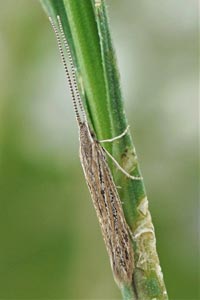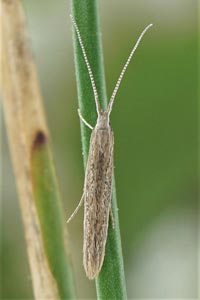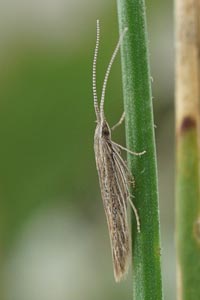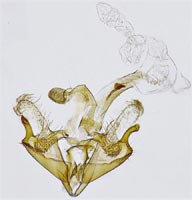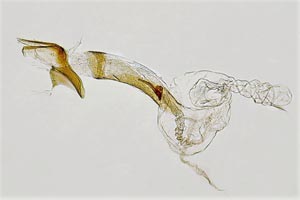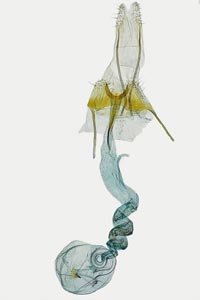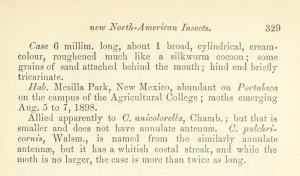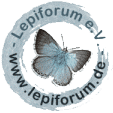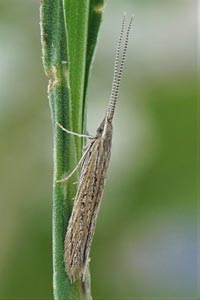

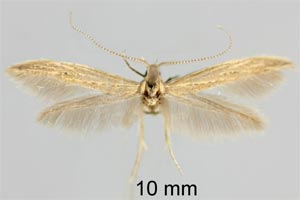

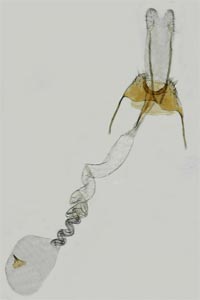
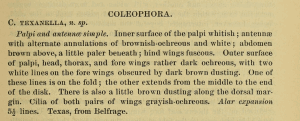
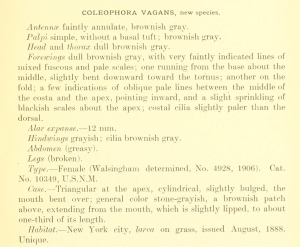
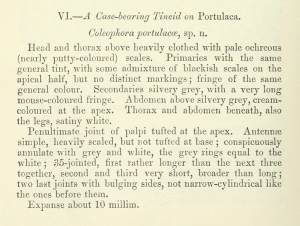
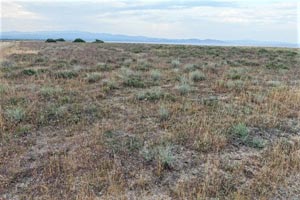
2. Diagnose
2.1. Männchen
2.2. Weibchen
2.3. Genitalien
2.3.1. Männchen
2.3.2. Weibchen
2.4. Erstbeschreibung
2.5. Beschreibung als Coleophora vagans
2.6. Beschreibung als Coleophora portulacae
3. Biologie
3.1. Habitat
3.2. Nahrung der Raupe
- [Portulacaceae:] Portulaca oleracea (Portulak)
Nach Landry et al. (2013) ist die Art ein Blattminierer an Portulak (Portulaca oleracea), einem weltweit verschleppten und vielfach häufigen "Unkraut".
4. Weitere Informationen
4.1. Synonyme
- Coleophora portulacae Cockerell, 1898 [Synonym nach Pohl & Nanz (2023)]
- Coleophora vagans (Meyrick, 1928) [synonymisiert von Landry, Nazari, Dewaard, Mutanen, Lopez-Vaamonde, Huemer & Hebert (2013)]
- Coleophora coxi (Baldizzone & van der Wolf, 2007) [synonymisiert von Landry, Nazari, Dewaard, Mutanen, Lopez-Vaamonde, Huemer & Hebert (2013)]
4.2. Faunistik
Nach Baldizzone & van der Wolf (2007) kommt die neu beschriebene "Coleophora coxi" auf Sizilien (locus typicus: Catania Fondachello), auf dem Festland von Italien sowie auf dem Peloponnes, Zakynthos und Kreta (Griechenland) vor. Landry et al. (2013) ergänzen aus Europa noch Frankreich. Sie stellen fest, dass die Art in Europa wohl erst in jüngster Zeit eingeschleppt wurde und in ihrer nordamerikanischen Heimat längst unter dem Namen Coleophora texanella (locus typicus: USA, Texas, [Bosque Co.]) beschrieben war. Richter & Pastorális (2015) melden die Erstnachweis dieser Art aus Kroatien (Prosika, 6. September 2008 und Tribunj, ab 2010) und Mazedonien (Nordmazedonien) (Gopceli, 28.-29. Mai 2013). Sie teilen mit, dass die Art auch schon auf dem Peloponnes (Griechenland) gefunden wurde. Barton (2015) ergänzt einen Fund bei Nikokleia auf Zypern. Richter (2017) meldet die Art erstmals aus Bulgarien, Gastón & Vives Moreno (2020: 314) aus Spanien. Die rasend schnelle Ausbreitung in Europa erklärt sich nur mit beständiger Verschleppung durch Pflanzentransporte, etc.
Bolt & Grunder (2021: 172) berichten über den Erstnachweis der Art in der Schweiz: "CH-Verscio (TI), 235 mü.M., 13.06.2019, Lichtfang, 1 Männchen, leg. Hans-Ueli Grunder, gen. det. Jürg Schmid. Der Fundort ist eine Ruderalfläche auf der dynamischen Flussaue der Melezza, welche bei extremem Hochwasser periodisch überschwemmt wird."
(Autoren: Erwin Rennwald & Jürgen Rodeland)
4.3. Literatur
- Baldizzone, G. & J. Nel (2009): Sur la biologie de Coleophora coxi Baldizzone & van der Wolf, 2007 (Lepidoptera: Coleophoridae). — SHILAP Revista de lepidopterología 37 (148): 515-518. [PDF auf redalyc.org]
- Beschreibung als Coleophora coxi:Baldizzone, G. & H. W. van der Wolf (2007): Coleophora coxi Baldizzone & van der Wolf, sp.n.: A new species from the Mediterranean region (Lepidoptera: Coleophoridae). — SHILAP Revista de Lepidopterología 35 (137): 91-95. [PDF auf redalyc.org]
- Barton, I. (2015): A contribution to the microlepidopteran fauna of Cyprus. — The Entomologist's Record and Journal of Variation 127 (4): 157-167.
- Bolt, D. & H.-U. Grunder (2021): Drei neue Kleinschmetterlinge für die Schweiz (Lepidoptera: Coleophoridae, Cosmopterigidae, Gracillariidae). — Entomo Helvetica, 14: 171–175. [Digitalisat auf e-periodica.ch]
- Erstbeschreibung: Chambers, V. T. (1878): Descriptions of new Tineina from Texas, and others from more northern localities. — Bulletin of the United States Geological and Geographical Survey of the Territories 4: 79-106. Washington (Government Printing Office).
- Beschreibung als Coleophora portulacae: Cockerell, T. D. A. (1898): New North-American Insects. — The Annals and Magazine of Natural History, Including Zoology, Botany, and Geology. Seventh series 2 (10): 321-331.
- Gastón, J. & A. Vives Moreno (2020): Contribución al conocimiento de los Lepidoptera de España con la descripción de cuatro nuevas especies para nuestra fauna y otras citas de interés (Insecta: Lepidoptera). — SHILAP Revista de lepidopterología 48 (190): 307-324.
- Lectotypus-Festlegung: Landry, J.-F., Nazari, V., Dewaard, J. R., Mutanen, M., Lopez-Vaamonde, C., Huemer, P. & P. D. N. Hebert (2013): Shared but overlooked: 30 species of Holarctic Microlepidoptera revealed by DNA barcodes and morphology. — Zootaxa 3749 (1): 1-93 [PDF www.mapress.com].
- Pohl, G. R. & S. R. Nanz [ed.] (2023): Annotated taxonomic checklist of the Lepidoptera of North America, North of Mexico: i-xiv, 1-580.[Excel-Datei zu diesem Buch]
- Richter, I. (2017): New findings of the case-bearing moth genus Coleophora from the Balkan Peninsula with the description of Coleophora vardarella sp. nov. (Lepidoptera: Coleophoridae). — Microlepidoptera.hu, 12: 83-94. [PDF auf oszk.hu] bzw. [ganzes Heft: PDF auf oszk.hu]
- Richter, I. & G. Baldizzone (2025): New faunistic and biological records on Coleophoridae from the Balkans (Lepidoptera). — Lepidopterologica Hungarica 21: 27-39.
- Richter, I. & G. Pastorális (2015): New findings of case-bearing moth species of Goniodoma and Coleophora genera from the Balkans (Lepidoptera: Coleophoridae). — Microlepidoptera.hu 8: 29-42. [PDF auf epa.oszk.hu]
- Tabell, J., Kullberg, J., Mutanen, M., Tokár, Z. & P. Sihvonen (2023): New and little known Coleophora Hübner, 1822 species from Morocco. Part I. (Lepidoptera, Coleophoridae). — Zootaxa 5374 (2): 151–195. [Zum PDF auf mapress.com]
- Tóth, B., Dombi, O. & A. Takács (2024): Coleophora texanella Chambers, 1878, a new alien species in Hungary (Lepidoptera: Coleophoridae). — Folia entomologica hungarica 85: 107-114. [PDF auf researchgate.net]
- Beschreibung als Coleophora vagans: Walsingham (1907): Descriptions of new North American Tineid Moths, with a generic table of the Family Blastobasidae. — Proceedings of the United States National Museum 33 (1567): 197-228.


![Einzelnachweis in der Schweiz [https://www.lepiforum.de/2_forum_2017.pl?page=1;md=read;id=37969]](/res/img/flag/ch.png)

![Vorkommen in Ungarn [Tóth, Dombi & Takács (2024)]](/res/img/flag/hu.gif)
![Vorkommen in Frankreich (europäisches Territorium ohne Korsika) [Vandromme et al. (2020): Liste systématique et taxinomique des Lépidoptères de France]](/res/img/flag/fr.gif)
![Vorkommen auf Korsika [Vandromme et al. (2020): Liste systématique et taxinomique des Lépidoptères de France]](/res/img/flag/fr-cor.png)
![Vorkommen in Spanien (Festland) [Gastón, J. & Vives Moreno A. (2020)]](/res/img/flag/es.gif)
![Vorkommen auf den Kanarischen Inseln [Vives Moreno, A. (2014)]](/res/img/flag/es-cn.png)

![Vorkommen in Sizilien [Locus typicus des Synonyms C. coxi]](/res/img/flag/it-sic.png)
![Vorkommen in Kroatien [Richter & Pastorális (2015); Baldizzone (2020)]](/res/img/flag/hr.gif)
![Vorkommen in Nordmazedonien [Richter & Pastorális (2015)]](/res/img/flag/mk.gif)
![Einzelnachweis in Albanien [Richter & Baldizzone (2025: 33)]](/res/img/flag/al.gif)
![Vorkommen in Bulgarien [Richter (2017)]](/res/img/flag/bg.gif)
![Vorkommen in Griechenland (Festland und festlandsnahe Inseln) [Baldizzone (2019: Fauna d'Italia)]](/res/img/flag/gr.png)
![Vorkommen auf Kreta [Baldizzone (2019: Fauna d'Italia)]](/res/img/flag/gr.gif)
![Vorkommen auf Zypern [Baldizzone (2019: Fauna d'Italia)]](/res/img/flag/cy.gif)
![Einzelnachweis in Marokko [Tabell, Kullberg, Mutanen, Tokár & Sihvonen (2023)]](/res/img/flag/ma.gif)
![Vorkommen in den Vereinigten Staaten von Amerika (USA) [Baldizzone (2019: Fauna d'Italia): locus typicus in Texas]](/res/img/flag/us.gif)
![Vorkommen in Russland (zwischen Manytsch-Niederung und Kaukasus-Hauptkamm) [Sinev (2021)]](/res/img/flag/ru.gif)
